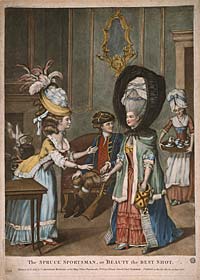Page content
Home and Beauty Recipes
Rose Balm- For hands, feet, elbows, and general dry skin
- 1/2 pound hogs lard (can be purchased in grocery stores labeled "lard")
- 1/4 pound or less of white wax (candle stubs or canning wax work well)
- Rose water*
- Alkanet root or cochineal pigment (if desired)
Place lard in a good size bowl. Pour a couple tablespoons full of rose water over the lard and mix well with your hands. Let it set for a day. Most lard purchased in stores has preservatives in it, so no worries about spoilage.
After a day, place lard in a double boiler. Slowly melt down the lard. If using pigment, add your pigment at this time. Once the lard is melted, add your wax. This is where you decide how hard you want your balm to be. More wax equals a harder balm. Err on the side of caution and add less the first time around, and if it isn't hard enough for you once it has cooled, melt it down again and add more wax. If it isn't soft enough, melt it down and add more lard. Once you have figured out the right consistency, If desired or needed, add more rose water while the concoction is still liquid. Pour liquid into small containers to cool (votive holders work well) and enjoy!
*You can substitute any scent you wish, just make sure it is strong enough.
Four Thieves Vinegar- Cleaning and freshening of rooms
- Medium bottle apple cider vinegar
- Dried or fresh:
- Sage
- Rosemary
- Thyme
- Lavender
- Glass container with cork
Loosely layer your herbs in your glass container until just over half full. Fill with your apple cider vinegar and cork off. Store in a cool, dry, dark place for 6 months. Resist the urge to sniff, the results will be more impressive if you don't. At the end of six months, pour off the vinegar and use for cleaning. The origin of this vinegar's story is in France, where a great plague was in full force. Four young men decided to take advantage of the situation, and broke in to the home of the sick. Amazingly, they themselves never got ill. They were finally caught and brought before the judge. The judge knew of their reputations, and made a deal with them. If they divulged their secret (how they themselves never came down with the plague, even after being in the homes of the sick), he would let them go free. Supposedly, this vinegar was their secret. This receipt is old even by the 18th century.
Cleaning of the skin
- White wine
- Rosemary (fresh or dried)
Boil the rosemary with the white wine for about 15 min. Let set to cool and strain out the rosemary. Dip a fine napkin in the liquid, and rub face vigorously.
Scented powder for body or hair
- Glass jar with cork
- Dried lavender flowers
- Starch (corn starch is used late in the 18th century, wheat starch is more common during the period. If you can find dried, powdered laundry starch, this is perfect!)
Gently bruise lavender flowers to release the scent. Bottle the starch up with your crushed lavender flowers, shaking it to mix it well and cork it tight. More flowers equals more scent. Let set for at least two months, so the starch will absorb all the scent. Sift the flowers out before use.
